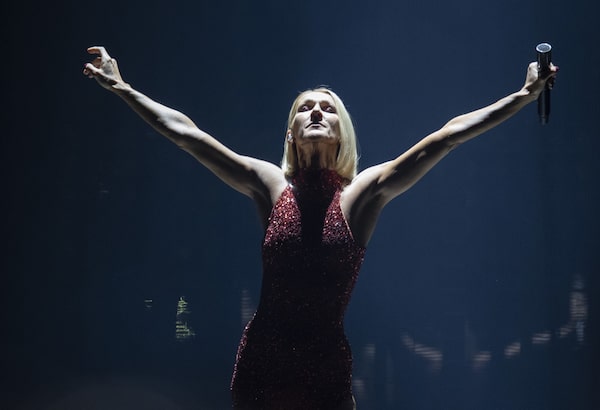
Singer Celine Dion performs during her world tour on Sept. 18, 2019.Jacques Boissinot/The Associated Press
The new documentary on Quebec superstar Celine Dion’s struggle with a rare neurological disorder is not for the faint of heart. I Am: Celine Dion takes her fans on such an emotional rollercoaster that one of them fainted during a Montreal screening of the Prime Video doc, while another visibly upset audience member had to be helped out of the room.
It is almost as if Ms. Dion, no longer able to belt out the power ballads that made her a global pop icon, has offered her fans the documentary equivalent of My Heart Will Go On – a wrenching composition with an over-the-top climax.
A reviewer for Britain’s The Telegraph described I Am: Celine Dion as “a weirdly compelling, yet discombobulating cross between Spinal Tap, Sunset Boulevard and a harrowing medical documentary.” That is Ms. Dion, at once parodying herself and channelling Gloria Swanson in the lonely Las Vegas mansion where she has spent the past few years in rehabilitation and out of the limelight.
Ms. Dion has always done things in big and eccentric ways. “My dream is to be [sic] international star,” she haltingly said in her first English interview, at age 15, in 1983. She proved the critics wrong. And there were plenty of them in Quebec back then. They mocked her hokey songs and naïveté.
That was until Ms. Dion put Quebec on the map. Most of the world had never heard of la belle province before she came along. Her rags-to-riches saga – as the youngest of 14 children who started out so poor the family lived on Maman Dion’s carrot pie – made her by far the most admired person in her home province.
Generations of francophone Quebeckers had grown up being told they were né pour un petit pain (born for bread crumbs), eternally condemned to a lower rank than their anglophone compatriots. Ms. Dion shattered the linguistic glass ceiling once and for all, without ever renouncing her Québécois roots or accent.
By the mid-1990s, after she had swept the Grammy Awards and made the cover of Time magazine, her stardom had come to represent much more than just a homegrown success story. Quebeckers had come to worship her in the same way an earlier generation had venerated Montreal Canadiens great Maurice (The Rocket) Richard.
“Her successes are the successes of all Québécois, as much as the Rocket’s goals were consolation for the humiliations experienced by French Canadians in the past,” political analyst Christian Dufour wrote in La Presse in 1996 after Ms. Dion opened the Canadiens new home arena, now known as the Bell Centre.
I have been following Ms. Dion’s career almost from the start. I was in the stands in 1984 when she sang before Pope John Paul II at Montreal’s Olympic Stadium. For years, as a Quebec Globe and Mail correspondent starting in the 1990s, it became impossible not to write about her, such was her importance to the province’s cultural and yes, political, identity at the height of her fame.
So I empathized with Quebeckers when Ms. Dion revealed, in late 2022, that she had been diagnosed with stiff person syndrome. The condition, as she recently disclosed in interviews to promote her new documentary, had robbed her of her ability to perform without taking prodigious quantities of Valium. Her once ethereal voice had been reduced to a nasal drone; she had to lower the keys on some songs or drop them from her repertoire. She eventually had to stop singing altogether.
In other words, her fairy tale had turned tragic. No one felt her pain more than Quebeckers. Her most loyal fans around the world may have grieved intensely. But the impact on the collective psyche of Quebeckers has been especially deep. Now, evoking Ms. Dion’s name in Quebec is to provoke a pang of sadness.
The gruelling media junket Ms. Dion undertook in the run-up to the release of her documentary has many full-time Celine watchers speculating that she is now well enough to contemplate an imminent return to the stage. The CBC even sent chief correspondent Adrienne Arsenault to Las Vegas to snag a sitdown with her. Ms. Dion insisted: “Oh, I’ll sing again. I’ll sing again. That’s for sure.”
Le Parisien, a tabloid newspaper in the French capital, has reported that Ms. Dion could sing at next month’s opening of the Paris Olympics. She did not quash that rumour when asked about it at this week’s New York premiere of her documentary.
At 56, Ms. Dion has nothing to prove. But a comeback would be a triumph not just for her, but for all Quebeckers. That is just how much she matters to them.